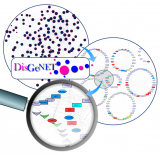
15/12/2015
Thesis defence of Janet Piñero on December the 17th: "Computational approaches and resources to support translational research in human diseases"
Next thursday, 17th of December at 11.00 h, Janet Piñero González, member of the Integrative Biomedical Informatics group of GRIB will defense her thesis "Computational approaches and resources to support translational research in human diseases" at Josep Marull room placed on the ground floor of Doctor Aiguader, 80 (Campus Mar Building). You are all invited to this event.
Abstract:
In the last two decades, biomedical research has experienced a revolution driven by technological advances that have resulted in the dramatic growth in the volume and variety of data. The fragmented nature of this process has produced bottlenecks in the analysis and extraction of knowledge from this sea of information. To overcome this hurdle, better catalogs that integrate heterogeneous data types, offer easy access to users, and at the same time, support automatic workflows, are needed. With this in mind, we have developed DisGeNET, a discovery platform that contains information on more than 17,000 genes related to over 14,000 diseases, which makes it one of the largest repositories of its kind, and therefore a valuable resource to support bioinformatics research. We have used DisGeNET to study the global, local, and mesoscale properties of disease genes in the context of protein interaction networks. To produce an accurate analysis of the mesoscale properties of the protein interaction networks, we first compared the network partitions generated by two popular clustering algorithms, in order to assess how this choice would impact the follow-up biological analysis. Using the best performing algorithm we then explored the network properties of disease genes, and found that the analysis of the properties of disease genes as a whole is not very informative, given that groups of genes associated to different disease classifications exhibit different, and sometimes, opposite behavior. Then we evaluated the relationship between the network properties of different groups of disease genes and their tolerance to likely deleterious germline variants across human populations. Finally, we have developed a new method to study disease comorbidities, by combining DisGeNET and molecular networks data in a network medicine approach and we applied this method to the analysis of COPD, one of the most prevalent respiratory diseases, and its comorbidities.



